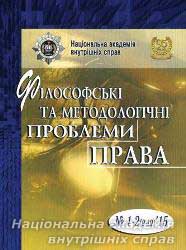Legal Education in European Sociocultural Context Middle Ages
Keywords:
education, legal education, law, lawyer, university, quality of education
Abstract
In this article author considers the peculiarities of juristic education in Europe as a unique cultural and historical, anthropological, legal phenomenon. Applying cultural approach to the study of professional culture and educational heritage of the intellectual elite jurists of Europe, the author proves the possibility of its use for the generalization of information about how to prepare the teaching staff, about the relationship between academic learning and professional skills in the centers of juristic education, about the relationship of juristic education and worldview references of cultural epochs, about the relationship of juristic education and worldview references of cultural epochs. The article investigates the juristic education in the socio-cultural context as an organized system of values and norms. In juristic education as in the element of a particular cultural epoch the dominant worldview, the nature of scientific rationality, the image of a man and the perspectives on the world in the concentrated form are viewed. The three step scheme of European juristic education: medieval, new time, modern, is proposed. The main features of juristic education of each stage are described and highlighted. In addition, university as the social-building phenomenon and the phenomenon of European culture is studied. Author shows that the formation of the theory of the university was not only based on the needs of society, but also can be viewed as a result of understanding the experience of this unique phenomenon of European culture, the desire to build a metatheory of human knowledge in general, which main object is culture.Downloads
Download data is not yet available.
Abstract views: 94 PDF Downloads: 348
Issue
Section
History of philosophy of law
Copyright (c) 2017 Philosophical and Methodological Problems of Law

This work is licensed under a Creative Commons Attribution-NonCommercial-NoDerivatives 4.0 International License.
- Authors reserve the right to authorship of their own work and transfer to the magazine the right of the first publication of this work under the terms of the Creative Commons Attribution License, which allows other persons to freely distribute published work with mandatory reference to authors of the original work and the first publication of an article in this magazine.
- Authors have the right to enter into separate additional agreements on non-exclusive dissemination of the work in the form in which it was published in the journal (for example, to post an article in the institution's repository or to publish as part of a monograph), provided that the link to the first publication of the work in this journal is maintained.
- The journal's policy allows and encourages the posting of articles by authors on the Internet (for example, in electronic storehouses of institutions or on personal websites), both before the submission of this manuscript to the editorial office and during its editorial processing, as this contributes to the creation of a productive scientific discussion and positively affects the efficiency and dynamics of citing the published work.




